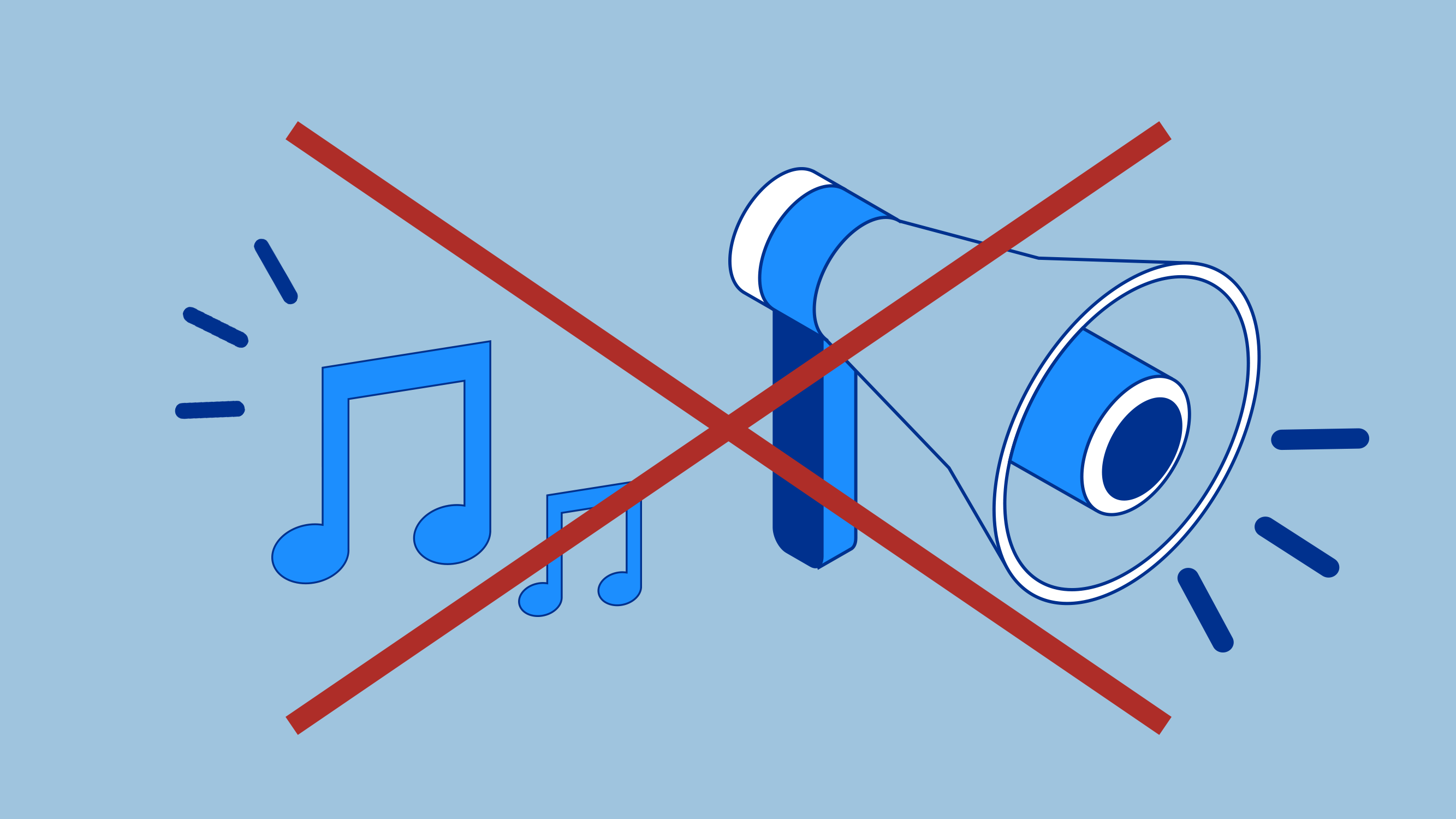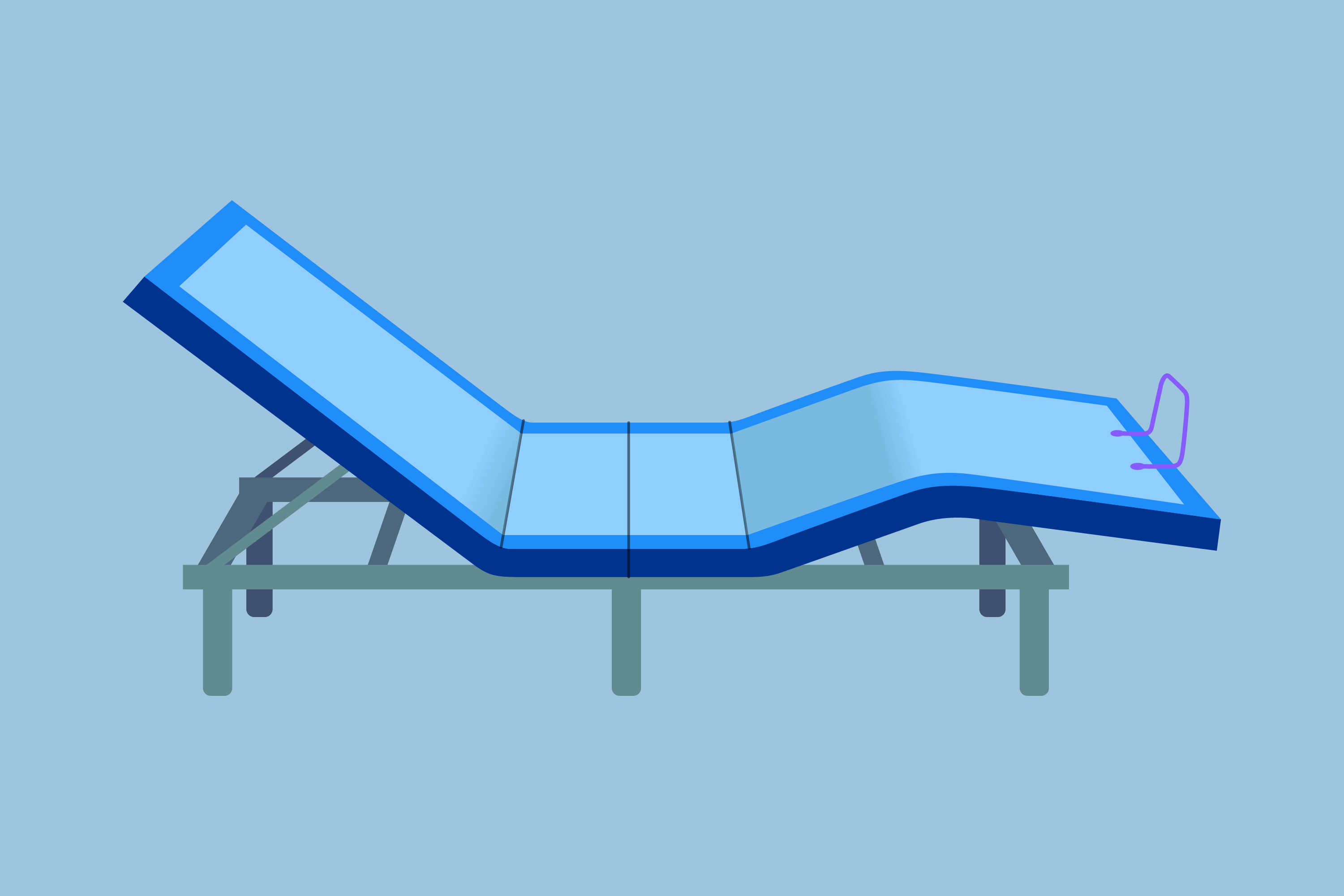Key Takeaways
- Why is Nighttime Noise Bad: Noise at night can disrupt your sleep and lead to chronic sleep deprivation. It can prevent you from falling asleep, wake you up after you’ve fallen asleep, or keep you from achieving deep sleep cycles.
- Effects of Long-Term Sleep Loss: Chronic sleep deprivation caused by noise can lead to serious health issues, including cardiovascular problems, cognitive impairment, diabetes, endocrine imbalances, weakened immune system, obesity, and increased susceptibility to accidents.
- Mitigate the Impact of Noise: Consider using strategies such as wearing earplugs, using noise-canceling headphones, or creating consistent background noise with a fan. Other options include installing heavy curtains or thicker doors to block outside noise, purchasing new windows to reduce noise infiltration, and adding soundproofing wall decorations or acoustic tiles to your bedroom.
Noise can be a nightmare when you’re trying to fall asleep. You find yourself just on the verge of slipping off to dreamland, and then a honking horn outside or a thunderous icemaker suddenly jerks you awake. If this happens on rare occasions, it’s just annoying. But if it happens night after night, it can lead to chronic sleep deprivation.
The good news is you don’t have to take noise in your bedroom lying down. There are tons of things you can do to reduce noise emissions, block them from your bedroom, or drown them out. A few tweaks to your bedroom layout or your bedtime routine might be all it takes to improve your sleep.
1. Wear Earplugs
 One of the easiest and most convenient things you can do to lessen irritating noise when you’re trying to go to sleep is to wear earplugs to bed. A set of foam earplugs can block out a ton of noise from both outside and inside your bedroom and help you ensure that you don’t hear it while you’re trying to drift off. They can also be good when you’re catching some Zzz’s on the go, helping you sleep well in a car or airplane.
One of the easiest and most convenient things you can do to lessen irritating noise when you’re trying to go to sleep is to wear earplugs to bed. A set of foam earplugs can block out a ton of noise from both outside and inside your bedroom and help you ensure that you don’t hear it while you’re trying to drift off. They can also be good when you’re catching some Zzz’s on the go, helping you sleep well in a car or airplane.
Just make sure that you’re replacing your foam earplugs frequently because failing to do so could lead to ear infections as the earplugs get dirty from use. If you’re using silicone earplugs instead of foam ones, make sure you’re cleaning them before each use.
2. Try Noise-Canceling Headphones
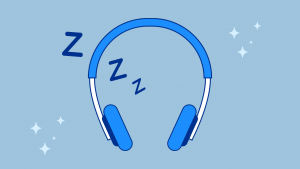 While earplugs can be great for some people, some people find the noise they can generate just as annoying. Earplugs often increase the noise generated by your own body.
While earplugs can be great for some people, some people find the noise they can generate just as annoying. Earplugs often increase the noise generated by your own body.
For instance, wearing a set of earplugs will amplify the sound of your own breathing. This doesn’t bother a lot of people, but it drives some people insane.
If this describes you, consider noise-canceling headphones instead. Noise-canceling headphones or earbuds can tune out certain frequencies in a way that earplugs alone can’t. They’re also still portable enough to be taken on trips, letting you curl up with a pair and sleep on an airplane like others might with earplugs.
If earplugs are amplifying the sound of your breathing too much or exacerbating your tinnitus, noise-canceling earbuds could fix these problems.
Just make sure you’re getting earbuds designed for sleep. These will be small and fit entirely inside the ear without having a bulge outside it.
3. Use a Fan for Consistent Background Noise
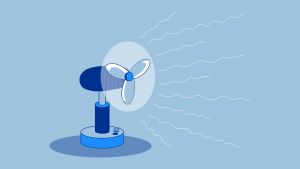 For many people, the issue is not the noise itself but the inconsistency and frequency of it. For instance, the sounds of the air conditioning kicking on or cars passing outside may jolt you awake because they are sudden and short-lived.
For many people, the issue is not the noise itself but the inconsistency and frequency of it. For instance, the sounds of the air conditioning kicking on or cars passing outside may jolt you awake because they are sudden and short-lived.
You may find that having consistent background noise that does not change frequency or volume is one of the best ways to block out other noise.
Having a box fan or rotating fan in your room can help create this consistent noise. Not only can sleeping with a fan help you sleep by drowning out noise, but it may also help improve your sleep by improving air circulation and reducing the temperature inside your room.
4. Install Heavy Curtains
 If the noise that’s keeping you awake is coming from the outside, consider blackout curtains. Heavy blackout curtains can muffle a surprising amount of sound. They’re a much more affordable way to block out noise from the street than, say, new windows or doors.
If the noise that’s keeping you awake is coming from the outside, consider blackout curtains. Heavy blackout curtains can muffle a surprising amount of sound. They’re a much more affordable way to block out noise from the street than, say, new windows or doors.
Another great thing about blackout curtains is they may also improve your sleep by blocking light as well as sound. Street lights and ambient light coming through your window can signal to your body that it’s time to be awake. However, blackout curtains can block this light to ensure that your body is not getting mixed signals from artificial light when you’re trying to go to sleep.
5. Purchase New Windows
 If you’ve got the budget for it, installing double-pane windows can greatly reduce the amount of noise coming into your bedroom from the outside. These windows block almost as much sound as the wall itself (and sometimes even more). This means they can help protect your bedroom from city noise.
If you’ve got the budget for it, installing double-pane windows can greatly reduce the amount of noise coming into your bedroom from the outside. These windows block almost as much sound as the wall itself (and sometimes even more). This means they can help protect your bedroom from city noise.
Another fantastic thing about these windows is that they are also much better at maintaining temperature. Double-pane windows keep comfortable air in and uncomfortable air out. This means you save on energy costs and reduce your carbon footprint, and it’s a lot easier to keep your bedroom at the ideal temperature for sleep if you have these windows.
6. Find Muffling Wall Decorations or Acoustic Tiles
 If your thin walls are the problem, consider getting foam or other soundproof wall decorations to block out noise. These don’t have to look terrible. You can put up things like wall rugs, decorative curtains, tapestries, and even foam art.
If your thin walls are the problem, consider getting foam or other soundproof wall decorations to block out noise. These don’t have to look terrible. You can put up things like wall rugs, decorative curtains, tapestries, and even foam art.
Bookshelves are also great at blocking noise. The wood of the shelves can absorb some sound, but if you fill the bookshelves with your book collection, the thick paper barrier will block sounds on the other side of the wall.
Another option is acoustic tiles. Acoustic tiles or panels reduce ambient sound by absorbing the sound waves. This can help block out the sound that’s coming through your bedroom wall and it can also help reduce echo and ambient sound inside your bedroom. For instance, your partner’s snores will no longer be bouncing off the walls, amplified by their solid surface.
7. Get a Thicker Bedroom Door
 While you’ve likely though of sleeping with your door closed, one thing that might not have occurred to you during your fight against nighttime noise is the quality of your door. If your windows are fine and your walls are thick, then the bedroom door might be the issue.
While you’ve likely though of sleeping with your door closed, one thing that might not have occurred to you during your fight against nighttime noise is the quality of your door. If your windows are fine and your walls are thick, then the bedroom door might be the issue.
Plenty of noise can seep through and under the thin, flimsy doors typically found on the interiors of apartments and houses.
If your family is watching TV or talking while you’re trying to sleep, and the noise is keeping you awake, your door could be to blame. So consider getting a thicker door made of solid wood to go on your bedroom door frame. This can help block some of the noise coming from other areas inside your home.
8. Block the Space Underneath Your Door
 Of course, there’s no point in getting a new door if there’s a giant space underneath it that’s letting in all the sound the door itself should be blocking. The good news is they make foam door sweeps that slide under the door and block out noise on both sides.
Of course, there’s no point in getting a new door if there’s a giant space underneath it that’s letting in all the sound the door itself should be blocking. The good news is they make foam door sweeps that slide under the door and block out noise on both sides.
These door sweeps also move with the door so that you don’t have to pick them up or replace them when you open your bedroom. You can just slide them under the door and never think about it again.
If you don’t want to pay for this extra sound protection, you can get it for free by stuffing a towel or using an old pillow in the gap between your bedroom door and the floor before you go to bed.
Even layering rugs around the bedroom with a smaller rug by the door can help you muffle outside noise.
9. Rearrange Your Bedroom
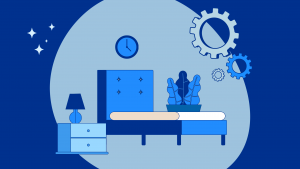 If your bed is pressed up against a noise source, like a thin wall that borders on a neighboring apartment or occupied bedroom, consider rearranging your bedroom to move your bed as far from this noise source as possible.
If your bed is pressed up against a noise source, like a thin wall that borders on a neighboring apartment or occupied bedroom, consider rearranging your bedroom to move your bed as far from this noise source as possible.
When you move your bed, putting a little physical distance between you and the bothersome noise can often be just enough to allow you to ignore it, even if you still hear it on occasion.
10. Move Your Bedroom
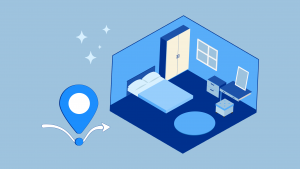 If you move your bed and find it doesn’t work, consider moving your actual bedroom. Maybe you live in an apartment with an empty bedroom that you use as an office or a gym. If this is the case, it can be easy to simply switch things up by moving your bed and bedroom furniture into the spare room and your other gear into your existing bedroom.
If you move your bed and find it doesn’t work, consider moving your actual bedroom. Maybe you live in an apartment with an empty bedroom that you use as an office or a gym. If this is the case, it can be easy to simply switch things up by moving your bed and bedroom furniture into the spare room and your other gear into your existing bedroom.
11. Talk about a “Sleep Divorce”
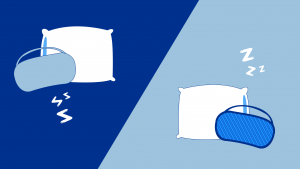 Sometimes, the reality is that your partner is the source of the noise that’s keeping you awake. Snoring is the most obvious issue here, especially if it is overly loud or inconsistent. But there are other ways a partner might make noise too.
Sometimes, the reality is that your partner is the source of the noise that’s keeping you awake. Snoring is the most obvious issue here, especially if it is overly loud or inconsistent. But there are other ways a partner might make noise too.
Perhaps they talk in their sleep or roll around and squeak the bed all night. Maybe your partner has a different sleep routine and is falling asleep later or waking up much earlier than you. Regardless of the reason for the noise, constant sound right next to your ear can keep you awake.
For this reason, many couples agree to what’s commonly known as a sleep divorce. In this scenario, each partner sleeps in their own bed or even their own bedroom to reduce nocturnal interruptions. If your partner’s constant noise is keeping you awake all night, this may be the only solution for you to both get a good night’s sleep.
12. Treat Your Partner’s Sleep Conditions
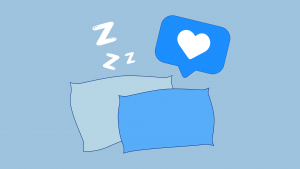 If you don’t have the extra space to accomplish a so-called sleep divorce, or you don’t want to lose your bed partner, consider other options. One of the most common causes of snoring that is loud and disruptive is obstructive sleep apnea.
If you don’t have the extra space to accomplish a so-called sleep divorce, or you don’t want to lose your bed partner, consider other options. One of the most common causes of snoring that is loud and disruptive is obstructive sleep apnea.
With obstructive sleep apnea, the soft tissues inside the roof of the mouth and the throat fall into the airways as the muscles that normally hold them in place relax for sleep. This can lead to extreme snoring and also cause a host of other issues, including oxygen deprivation during sleep.
The good news is it’s easy to treat sleep apnea and stop snoring. Your snoring partner will just have to go to a sleep specialist and get a Continuous Positive Airway Pressure (CPAP) machine.
CPAP machines gently force air through the airways to keep them open during the night. Not only can this protect your partner from all of the terrible consequences of sleep apnea, but it can eliminate their loud snoring as well.
Another method that can ease the symptoms of sleep apnea is elevating the upper body. This can be done with a simple wedge pillow or with an adjustable bed.
13. Think About Noise Sources You Can Control
 Sometimes, the noises keeping you awake are entirely within your control. For instance, you can start the dishwasher or the dryer long before you go to sleep so that these items do not keep you awake during the night.
Sometimes, the noises keeping you awake are entirely within your control. For instance, you can start the dishwasher or the dryer long before you go to sleep so that these items do not keep you awake during the night.
You might even be able to have an HVAC tune-up to make this machine run more smoothly so that it starts and stops with less noise. So try to identify exactly which noises are keeping you awake at night. They might just be things that you can do something about without too much trouble.
14. Consider Finding a New Place
 Making the switch to a new apartment might seem pretty extreme, but if you’ve tried everything else to no avail, it might be your only option.
Making the switch to a new apartment might seem pretty extreme, but if you’ve tried everything else to no avail, it might be your only option.
Contrary to what many in modern society want to believe, sleep isn’t a luxury or an indulgence. Sleep is just as essential for health and life as food, water, and air. So if your noisy neighbors or the busy streets outside are keeping you awake, and nothing helps, you might want to consider finding a new place as a last resort to get your much-needed shuteye.
How Noise at Night Affects Your Sleep
Noise at night is one of the most common offenders when it comes to interrupted sleep (along with things like artificial light, stress, and temperature fluctuations). Noise can interrupt your sleep in a variety of ways. Sometimes, you’ll know right off the bat that noise is interrupting your sleep, but sometimes, you might not figure it out for a long time.
It May Prevent You From Falling Asleep
If noise at night is making it impossible to fall asleep, this will be obvious most of the time, and you won’t have to waste time trying to figure out what’s keeping you up or if you’re being kept awake at all. Still, it’s difficult to escape the effects of such sleep deprivation.
“Sleep serves a vital physiological function and is probably the single most important factor in exercise recovery,” notes Dr. Nayantara Santhi. “Besides helping the body to recover from fatigue by repairing processes, sleep also plays a vital role on neurophysiology, cognitive function, and mood, all of which suggest that sleep plays a vital role in waking lives.”
There are a million loud sounds that can keep you up. Between the neighbor’s dogs barking, sirens howling, car engines roaring, and your kids yelling at the TV even after you’ve told them to go to bed a thousand times, the city and the suburbs are not exactly designed for a good night’s sleep.
Sometimes noise doesn’t even have to be all that loud to keep you from falling asleep. If you have sensitive hearing or are a picky sleeper, the slightest sound can jolt you awake just when you’re about to drift off or even stave off sleep entirely. The noise that keeps you awake at night could be as simple as a ticking clock or the sound of your partner breathing.
What’s worse is that if you wind up dealing with noise frequently, just the thought of trying to go to sleep despite the noise can be enough to excite your nervous system and keep you awake – even if the noise itself is gone! This is why it’s important to identify and eliminate noise that keeps you up as quickly as possible.
The good news is this is the easiest issue to solve. Most of the time, you’ll know exactly what’s keeping you from falling asleep. And knowing the problem makes it much easier to solve, whether it’s dealing with your partner’s snoring, cutting off the kids’ TV access in the bedroom, or blocking street noise.
It May Wake You Up After You Fall Asleep
Not only can noise make it impossible to fall asleep, but noise while sleeping can also interrupt your good night’s sleep. The main problem when you get woken in the middle of the night is that it’s often difficult to decipher the noise that’s disturbing you.
Of course, sometimes it’s obvious. Sometimes, it may even be a noise you need to hear, like a smoke alarm or your crying baby. However, sometimes a sound may jolt you awake and evaporate before you realize what it was. If this happens on rare occasions, it may not be that big of a deal.
However, if it happens more frequently, it could keep you from sleeping long enough or maintaining quality sleep. If this is the case, you may need to do some experiments to determine what’s disrupting your sleep.
Try different things at night, such as using wall decorations or a towel under your door to block out noise in your bedroom. If this does not work, the noise may be coming from your bedroom itself. In this case, try earplugs or a fan to cover the noise.
If even this doesn’t work, you might have to resort to recording sounds in your bedroom to determine what exactly is jolting you awake at night.
It May Keep You From Achieving Deep Sleep Cycles
The most insidious and difficult-to-determine noise problem is the noise that keeps you from achieving deep sleep without actually waking you up. Your body cycles through four phases of sleep at night. The first three stages are NREM sleep, then REM sleep. Stages N1 and N2 are lighter sleep phases that last one to five minutes and 10 to 25 minutes, respectively.
Stage N3 is a deep sleep stage, and without getting enough deep sleep, you’ll wake up feeling groggy and like you didn’t sleep at all.
The bad news is that noise can sometimes prevent you from cycling into an N3 or REM phase without pulling you out of the lighter sleep cycles. If this happens, you may not even realize it. However, a big clue that you’re not achieving deep sleep is waking up feeling like you’ve been awake all night.
If you frequently wake up feeling unrefreshed and still drowsy, even after taking a few minutes to become fully awake, you may be suffering from low-quality sleep. Of course, noise is not the only thing that can keep you from achieving poor-quality sleep. Stress, certain medical conditions, hormone changes, and other issues can all contribute to this problem.
However, noise at night is a major factor that can contribute to poor sleep quality because you can hear almost as well during light sleep as you can when you’re awake. If your brain is busy picking up and processing noises during light sleep, this can keep you stuck in the first two phases of sleep and prevent you from achieving full sleep cycles.
There are some things you can do if you suspect this is the case. Try using a fan to keep the noise level consistent and drown out intrusive sounds. Also, consider sleeping with earplugs to block out potential noise sources you don’t know about. If you’re still experiencing sleep disturbances, it may be time to talk to a sleep specialist.
The Consequences of Long-Term Sleep Deprivation
You may think that the noise interrupting your sleep is not the end of the world. If you don’t feel all that bad from a little missed shuteye, you might even be tempted to ignore the fact that you’re being kept awake. But even if poor-quality sleep doesn’t seem to affect your daytime activities, sleep deprivation could be doing massive damage to your body and brain.
Just how much sleep do you need? The average adult needs at least seven hours of sleep per night. Children and seniors need even more! You also need to experience four to five full sleep cycles each night to ensure you’re getting not just a sufficient quantity of sleep but sufficient quality sleep. If your sleep quality or quantity is insufficient for a long time, it could lead to a host of serious consequences.
Cardiovascular Damage
A long-term lack of sleep is terrible for your heart and can cause serious damage to the cardiovascular system. It can lead to the development of high blood pressure and heart disease. This, in turn, can increase your likelihood of suffering a heart attack or stroke.
This is because sleep is vital to maintaining the processes that keep your heart and circulatory system healthy. Without it, your body cannot regulate these systems and is also subject to increased inflammation, which, of course, causes damage to the cardiovascular system as well. This means you fall into poorer and poorer cardiovascular health as your aerobic conditioning deteriorates.
Cognitive Impairment
The sleep-deprivation-related problem you’ll likely notice first is cognitive impairment. Even one night of poor sleep can create issues with your memory, concentration, and cognitive processing abilities. As you can imagine, months or years of poor sleep are even more damaging.
Long-term sleep deprivation wreaks havoc on the brain. If it’s severe enough, you may experience sleep deprivation psychosis. This is a form of temporary insanity caused by a lack of sleep. It can be accompanied by disordered thinking, paranoia, and complex, realistic hallucinations.
Less severe long-term sleep deprivation consequences are not less significant. There’s a growing body of evidence showing that years of sleep deprivation can contribute to or even cause dementia and Alzheimer’s. Verified Source National Library of Medicine (NIH) World’s largest medical library, making biomedical data and information more accessible. View source
Diabetes
Sleep deprivation can lead to the development of diabetes in a number of ways. First off, it can cause you to neglect exercise and eat more junk food – both risk factors for weight gain and the development of type two diabetes.
The second way sleep deprivation can contribute to diabetes development is by interrupting your digestive processes. Sleep helps regulate the production of hormones that control hunger and the feelings of fullness. If these hormones are thrown off balance, you may snack more at night, which throws off insulin levels and causes additional blood sugar spikes.
Endocrine Problems
Not only does sleep deprivation impact the levels of hunger and satiation-related hormones in your body. It impacts the levels of just about every hormone in your body. Sleep deprivation can disrupt testosterone production in men and estrogen production in women.
It can also interrupt growth hormone production in adults and especially children. Human growth hormone (HGH) controls the body’s ability to repair itself, regenerate cells, and maintain muscle mass. With lower levels of this hormone, your ability to heal and repair your tissues may be compromised.
Immune System Issues
Sleep deprivation decimates the immune system. When you sleep your immune system is busy producing antibodies and other weapons in the war against dangerous pathogens. This means a lack of sleep can impede the production of vital compounds that your immune system needs to function.
When you fail to get enough sleep, you may notice you get sick more frequently, more severely, and for longer periods of time than you used to. Diseases your body could have once fought off with ease may suddenly become serious illnesses.
Obesity
Sleep deprivation is well-known to contribute to or cause weight gain. In this case, the lack of sleep often touches off a vicious cycle that feeds and prolongs itself.
When you’re too tired to exercise, you don’t. When you don’t get exercise, your sleep quality and quantity are often both negatively impacted. Then you’re too tired to exercise the next day, and your sleep is even worse the next night. It’s easy for this problem to become a long-term pattern.
Sleep deprivation also impacts weight gain by causing you to eat more empty calories and unhealthy foods. When you’re not getting energy from rest, your body will seek it from something else. You may also be tempted to comfort yourself with junk food if you’re feeling bad from poor sleep.
Increased Susceptibility to Accidents
The cognitive impairment that accompanies sleep deprivation can make you more likely to experience a wide array of accidents. The most obvious of these would be car accidents. Driving drowsy is very dangerous, and it’s estimated that driving drowsy is responsible for over 90,000 vehicular accidents per year.
Auto accidents are not the only threat you have to consider. Just about every other conceivable accident becomes more likely the less sleep you get. Slips and falls, cuts, bone breaks, and other injuries are all increased by sleep deprivation because the signals sent by your central nervous system are slowed by your lack of sleep, affecting everything from your reflexes to your coordination.
Mood Disorders
One of the most well-known consequences of long-term sleep deprivation is the development of mood disorders, perhaps because these issues are some of the quickest to appear. Even one night of poor sleep can make you more irritable and less able to regulate your emotions.
Weeks and months of sleep deprivation can lead to more severe effects. You may experience increased impulsivity, anxiety, depression, and disproportionate or disordered anger. Sleep deprivation can also increase the severity or frequency of symptoms for those who already have mental health conditions.
Other Ways to Set Up the Bedroom for Better Sleep
Eliminating noises isn’t the only way to optimize your bedroom for sleep. Here are some of our other guides to help you create a more relaxing sleep space:
- Best and Worst Bedroom Colors for Sleep
- Creating a Calm, Clutter-Free Bedroom
- How a Tech-Free Bedroom Creates Smarter Sleep
- How to Make a Small Bedroom Look Bigger
- Fire Safety Tips While You Sleep
- How to Cool Down a Bedroom
- Best Plants for Your Bedroom
- Bedroom Set-ups for Children With Autism
FAQs
How can I soundproof a room quickly?
If you want to quickly soundproof your bedroom, the fastest noise reduction strategy you can implement is to install sound absorbers in strategic areas of the room. For instance, you can cover the windows with thick curtains, put foam paneling or acoustic tiles on the walls, and get a foam door sweep for the door.
If you have hard flooring, like wood or vinyl, also consider grabbing an area rug or two. These don’t just cut down on the noise from foot traffic. They also help reduce echo from sound bouncing off the walls and floor. For serious soundproofing, also consider replacing your doors and windows with new soundproof versions.
Can sleeping with earplugs or headphones hurt my ears?
Sleeping with earplugs will not hurt your ears if you do it right. Sleeping with overly firm earplugs or earplugs that do not allow your ears to breathe can cause wax build-up that can lead to temporary hearing loss and other issues. Failing to keep your earplugs clean or change them frequently enough could also lead to bacterial infections inside the ears.
To prevent these issues, you’ll need to ensure that you’re keeping your earplugs clean and changing them frequently, in the case of foam earplugs. You’ll also want to avoid using earplugs that are overly hard or that have no pores for air circulation, as these can irritate the inside of the ear canal and lead to wax build-up.
As long as you’re using soft, breathable earplugs and avoiding dirty and damaged earplugs, you should be able to use them without harming your ears.
Will blackout curtains block noise from outside?
Blackout curtains can noticeably cut the noise level in your bedroom. This is because thick cloth absorbs sound not just from outside the walls but inside them too. Blackout curtains will block the sound coming through the bedroom windows and, at the same time, prevent echo from your partner’s footsteps, your squeaky bed frame, and every other noise source inside your home.
Not only can thick curtains help improve your sleep by blocking sound, but they can also help you by blocking light. Street lights and ambient city lights send your body signals to stay awake when it should be asleep. Blackout curtains block out this light to help reduce wake signals in your bedroom.
Should my snoring partner and I sleep in separate rooms?
If your partner’s snores sound like a blender full of nuts and bolts, you might be considering moving into separate bedrooms. For some couples, this decision makes perfect sense. Many couples find that sleeping alone improves their relationship by improving their sleep. It’s easier for many people to sleep when they don’t have a snoring, sweaty, kicking partner next to them.
However, some people love sleeping next to their partner and don’t want to give it up. If this describes you, talk to your doctor about treatment for snoring. There are lots of ways to treat snoring and sleep apnea to ensure partners can both get a great night’s sleep in the same bed.
How do I know if noise is keeping me from achieving deep sleep?
Sometimes, if your deep sleep is interrupted without your lighter sleep cycles being affected, it can be difficult to tell what’s causing it or even that it’s happening at all. If you wake up feeling unrefreshed and tired even if you got a full eight hours of sleep, that is a good sign that the quality of your sleep may be poor and the duration of your deep sleep may be insufficient.
If you have a sneaking suspicion that your deep sleep cycles are being interrupted, it can be difficult to know why because noise is not the only thing that can cause problems with deep sleep. You may have to experiment around with different noise-reduction solutions to see if they leave you waking up more refreshed.
Bottom Line
Noise at night is one of the main sleep interrupters that can ruin your slumber. If you let noise keep you awake long enough, you could wind up with symptoms of chronic sleep deprivation. But with our list of the best ways to block noise and soundproof your bedroom, you can banish the noise from your bedroom and get an amazing night’s sleep every night.
About the author
April Mayer is a sleep expert and writer with a degree in exercise physiology. She has dedicated her career to exploring the relationship between sleep and productivity. Her insightful articles, such as "The Surprising Way Your Mood Might Be Messing With Your Productivity" and "Wake Up to More Productive Mornings," have been featured in reputable publications like Forbes, Greatist, Real Homes, Thrillist, Tom's Guide, and Eat This, Not That. With a passion for helping others lead more productive lives through restful sleep, April offers valuable expertise on foods and vitamins for better sleep. As a trusted member of the Early Bird team since March 2020, she continues to provide informative and well-researched content.
View all posts